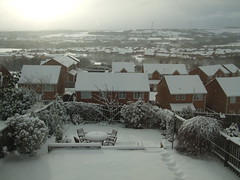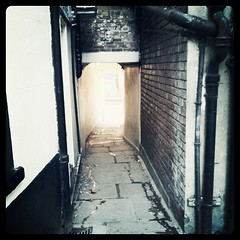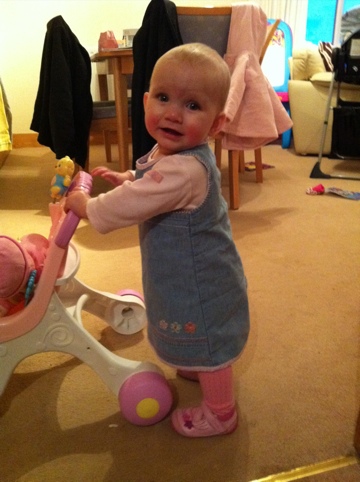A few months ago I developed sciatica, and I’ve had referral to a physiotherapist. I was there yesterday, as a matter of fact.
One of my biggest problems is my posture. I have a strong tendency to slump (apparently I also go constantly to one side – when I consciously straighten up I actually feel like I’m falling to the right. Weird. Anyway…) and I imagine I’m not alone. So the physio – Jenny, who’s lovely – has been trying to correct my posture. I have been taught how to stand, walk and sit straightly (another aside – I could actually learn an awful lot about this from my ten month old daughter…) and while I was practicing this in the clinic, I caught sight of my reflection in the window. I could have been starring in THE Pride and Prejudice.
Did you ever notice how straight-backed the girls were in that, especially Jane (which fits with her very proper character)? A result of underwear, yes, but also a lot of emphasis placed on deportment and carriage. Why do we not get the same emphasis now? When I was at school, being a hoarder who carried a ridiculous amount of STUFF around in my schoolbag, I was sometimes warned about posture by my mum but there was no real push to walk properly. In fact, it actually looks a bit odd to stand and walk tall, if not downright arrogant. It certainly feels odd. I know that to an extent that emphasis on deportment comes very much with the upper classes, and the need to present women as graceful and elegant; I have no real way of knowing if that is still the case today. And on the same lines, Regency working class women will not have had the same importance placed on deportment as the aristocracy. But I do think that deportment has been pushed firmly off most people’s priorities, perhaps even seen as frivolous or ‘posh’; it has a ring of ‘finishing school’ about it.
a lot of emphasis placed on deportment and carriage. Why do we not get the same emphasis now? When I was at school, being a hoarder who carried a ridiculous amount of STUFF around in my schoolbag, I was sometimes warned about posture by my mum but there was no real push to walk properly. In fact, it actually looks a bit odd to stand and walk tall, if not downright arrogant. It certainly feels odd. I know that to an extent that emphasis on deportment comes very much with the upper classes, and the need to present women as graceful and elegant; I have no real way of knowing if that is still the case today. And on the same lines, Regency working class women will not have had the same importance placed on deportment as the aristocracy. But I do think that deportment has been pushed firmly off most people’s priorities, perhaps even seen as frivolous or ‘posh’; it has a ring of ‘finishing school’ about it.
I’m not at all convinced this is a Good Thing. Why has it happened? I have a (totally unfounded on anything other than my own conjecture) theory that part of women’s emancipation, shedding restrictions such as corsets, led to us also shedding less tangible restrictions. We had the freedom to lounge like men, so we did. We felt free to focus on more important matters and dismiss carriage and posture as less so. We scoff at Victorian women, for example, distorting themselves to get a 10 inch waist in whalebone corsets, but the modern freedom I have to wear more relaxed clothes and slouch all the time is causing me harm too, and I’m fairly sure I wouldn’t have got away with it in a stricter age. I’m only 30, and I have back trouble – that’s not meant to happen! I do know that I am going to have to work very hard to get the posture that Jane Bennett had, and even if I do manage to train myself into it, I’ll look odd, unnatural, and I’ll definitely feel that way. It might be better for me, it might (and does) make me look far slimmer, but it just doesn’t feel right.
I personally think that women’s rights include the right to be, well, frivolous sometimes. It’s accepted pretty widely now that it’s not a cliche, we actually do like (in general) make-up, clothes, shopping. We like other things too, but there’s no shame in being girly. I like pink, I like my daughter in pink. (Aside – you probably saw some episode of QI where they discussed the fact that blue and pink for boys and girls is a modern thing. Fascinating. anyway…) I hope she likes pretty dresses when she’s able to choose her own stuff. And I hope I can learn from my mistakes and encourage her to walk upright and hold her head high. Then not only might she feel proud of herself, she might escape my back problems.
Besides, it’s also a girl’s prerogative to pretend she’s a Bennett girl.

 Do you know what I would really like? What would be amazing and brilliant and fantastic and… ok, ok I’ll get on with it.
Do you know what I would really like? What would be amazing and brilliant and fantastic and… ok, ok I’ll get on with it. The woman tried to move her feet. However much she wriggled and jiggled her legs, they wouldn’t free. She stood up straight, hands pushing into the small of her back, closing her eyes with a weary sigh.
The woman tried to move her feet. However much she wriggled and jiggled her legs, they wouldn’t free. She stood up straight, hands pushing into the small of her back, closing her eyes with a weary sigh. We reached a landmark for Emily a couple of days ago, her first shoes. She’s been standing for ages, cruising round furniture for weeks and trying to push her walker frames for about a fortnight, and her little pram shoes just weren’t giving her the support she needs. So, off we trotted to Clarks.
We reached a landmark for Emily a couple of days ago, her first shoes. She’s been standing for ages, cruising round furniture for weeks and trying to push her walker frames for about a fortnight, and her little pram shoes just weren’t giving her the support she needs. So, off we trotted to Clarks.